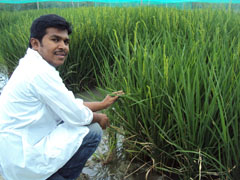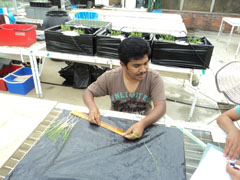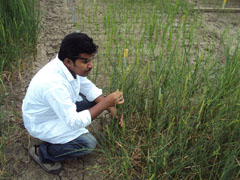Michael Selvaraj
The honor of membership into Sigma Xi spans disciplines and courses of research study.
Each month in the Sigma Xi Today section of American Scientist magazine, and also on our website, we will be highlighting a different "Fellow Companion"—asking them about their work and what the honor of induction into Sigma Xi has meant for their career.
The goal of molecular crop biologist Dr. Michael Gomez Selvaraj (SX 2011) is to improve food production. He works at the International Center for Tropical Agriculture in Colombia. Its mission is to conduct interdisciplinary and applied research through partnerships to increase the eco-efficiency of agriculture and reduce hunger and poverty in tropical regions.
Tell us about your educational background, including your doctoral research.
I am a molecular crop physiologist. I received my BS and MS degrees in agriculture from Tamil Nadu Agriculture University (TNAU) in Tamil Nadu, India, which is one of the leading agricultural technology providers in India and graduates are frequently recognized throughout the world. Without delay, I began my PhD in biotechnology with a specialization in molecular drought stress physiology, at the Center for Plant Molecular Biology at TNAU. As a recipient of a very prestigious Rockefeller Foundation fellowship, I started my PhD research in India on gene mapping and marker-assisted selection for drought resistant traits in rice. The goal is to identify drought resistant rice varieties to considerably improve rain-fed rice production across Asia. This research paper was published in two reputable international journals and I was awarded best thesis award for my PhD. My research took me to the Texas AgriLife Research and Extension Center, a part of the Texas A&M system, which is recognized as the primary center for agriculture research. I currently focus my research on peanut breeding and stress physiology.
I received my BS and MS degrees in agriculture from Tamil Nadu Agriculture University (TNAU) in Tamil Nadu, India, which is one of the leading agricultural technology providers in India and graduates are frequently recognized throughout the world. Without delay, I began my PhD in biotechnology with a specialization in molecular drought stress physiology, at the Center for Plant Molecular Biology at TNAU. As a recipient of a very prestigious Rockefeller Foundation fellowship, I started my PhD research in India on gene mapping and marker-assisted selection for drought resistant traits in rice. The goal is to identify drought resistant rice varieties to considerably improve rain-fed rice production across Asia. This research paper was published in two reputable international journals and I was awarded best thesis award for my PhD. My research took me to the Texas AgriLife Research and Extension Center, a part of the Texas A&M system, which is recognized as the primary center for agriculture research. I currently focus my research on peanut breeding and stress physiology.
Do you have a particular teacher or professor who inspired your love of science? Why?
Dr. Chandra Babu, Professor, crop physiologist, TNAU, India fundamentally taught me plant physiology, which jump-started my passion for my current research. I am indebted to Dr. Mark David Burow, a peanut breeder, who has made himself consistently available to me throughout the course of my work. I was happy to be given the opportunity to work as a teaching assistant in his genetics classes.
What is the focus of your current research?
I am currently working at the  International Center for Tropical Agriculture (CIAT), a subsidiary of the Consultative Group on International Agricultural Research (CGIAR). Its mission is to conduct interdisciplinary and applied research through partnerships to increase the eco-efficiency of agriculture and reduce hunger and poverty in tropic regions. My current research at CIAT focuses on improving eco-efficiency of crops in the global climate change, by establishing robust protocols and screening methods to integrate remote sensing tools such as imaging systems, for the automated quantification of functional traits contributing to abiotic stress. My responsibilities at CIAT are to establish and lead a phenotyping platform to facilitate gene discovery and target trait validation related to abiotic stress tolerance for CIAT mandatory crops, such as rice and cassava. This platform is specialized in implementing cutting-edge phenotyping tools for crop improvement.
International Center for Tropical Agriculture (CIAT), a subsidiary of the Consultative Group on International Agricultural Research (CGIAR). Its mission is to conduct interdisciplinary and applied research through partnerships to increase the eco-efficiency of agriculture and reduce hunger and poverty in tropic regions. My current research at CIAT focuses on improving eco-efficiency of crops in the global climate change, by establishing robust protocols and screening methods to integrate remote sensing tools such as imaging systems, for the automated quantification of functional traits contributing to abiotic stress. My responsibilities at CIAT are to establish and lead a phenotyping platform to facilitate gene discovery and target trait validation related to abiotic stress tolerance for CIAT mandatory crops, such as rice and cassava. This platform is specialized in implementing cutting-edge phenotyping tools for crop improvement.
Tell us about something we might see in our daily lives that directly correlates to your work.
Agriculture is essential in daily life. Nitrogen is a critical element in rice production. Too little nitrogen results in low yield and profit while too much can lead to environmental pollution. I am very proud to work on improving nitrogen use efficiency in rice to mitigate gas emission, which is a threat to the world.
Give us an example of how multi-disciplinary research directly contributed to your work.
Plant science research covers a wide range of fields. Our team of researchers is trying to find the answers to the mystery of drought-tolerant and nitrogen-uptake mechanisms utilizing next-generation sequencing technologies, gene transformation, physiological and remote sensing approaches in rice. I strongly believe that integrated approaches for crop improvement will lead to the next green revolution.
wide range of fields. Our team of researchers is trying to find the answers to the mystery of drought-tolerant and nitrogen-uptake mechanisms utilizing next-generation sequencing technologies, gene transformation, physiological and remote sensing approaches in rice. I strongly believe that integrated approaches for crop improvement will lead to the next green revolution.
What are your thoughts on the future of STEM education?
In this fast moving world, instilling students with a passion for science, technology, engineering, and mathematics will improve the country's socio-economic status. Despite the recent push for STEM education, I believe we are still a long way from meeting the challenge of generating young talents to address the scientific and economic challenges our society faces each day. Regardless of this, fostering educators who are effective at teaching STEM subjects is also very important. I strongly believe that engaging the younger generation in STEM education would help to identify new strategies to build a better world.
Describe the patent/publishing experience. Were there any bumps along the way for you?
I am fortunate to have frequently published my research papers in several reputable journals. I am very happy to note that some of my research papers have been cited by very high impact factor journals and the publishing experience has not been difficult for me.
What has the honor of induction into Sigma Xi meant to you?
Honor societies are an excellent way to reward hard work and I am honored to be a member of the prestigious society, Sigma Xi. The honor of nomination into the Society boosted my confidence in my research tremendously.
Has Sigma Xi helped further your career? If so, how?
Sigma Xi provides an excellent opportunity for members to meet other researchers and learn about innovations in varied fields of science and engineering. I strongly encourage young scientists to join the Society to learn more about the future of their fields and the work of their colleagues.
What books are you currently reading for pleasure?
To be honest, I am not an admirer of reading books as I rarely get to read books for pleasure. Instead, I often listen to pleasant music as I am a self-professed music lover. Besides this, I regularly read the Internet, in particular Yahoo and CNN.
When you're not working on your research, what do you do in your free time?
I love to relax with soothing music and like to hang out with my family and friends.
What’s your favorite movie?
It's hard for me to identify just one movie. I sincerely enjoyed The Matrix,The Sixth Sense, and Slumdog Millionaire.
What is your favorite motto?
"Worrying is like a rocking chair: it gives you something to do, but doesn't get you anywhere."
What advice would you give a young researcher just starting out in your field?
Agricultural education is a fundamental component of long-term sustainable food production. Since climate change affects agriculture and food production in complex ways, I would like to encourage budding researchers to be aware of the impact of climate change on food security. Working in agriculture offers students the opportunity to truly change the future of society with their research efforts.
Sigma Xi recently celebrated its 125th year. What advances do you see in your field of research over the next 125 years?
I predict progress in the fields of molecular biology and plant breeding towards crop improvement that will solve current issues in food production due to biotic and abiotic stresses. I strongly believe solid trait/gene that withstands stress tolerance in crop plants will be identified, allowing farmers to fight the effects of global climate change. Agricultural innovations on nitrogen and water use efficiency will reduce the cost of food production, and will no doubt help improve the lives of farmers around the world.